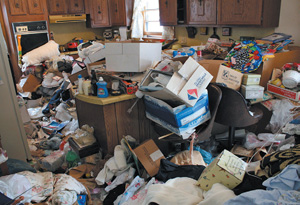
I wrote last week about a woman who has become an accumulator, or more accurately, a compulsive hoarder. Many look at such people as outcasts, strange, loners, etc. But, in fact, they are suffering terribly. Most of us can’t understand them and their behavior. How and why do they bring more and more things into their horribly overfilled homes? Once we begin to hear about the extent of their problem, we very well understand why their spouses leave or are threatening to leave. I can understand and sympathize with the anger people feel toward those individuals. They have rotten garbage and animal waste throughout the house. They live there with insects and rodents, and many are in danger of losing their children to protective service agencies because of the terrible health risk to them.
I don’t join those looking on in their anger. I understand the pain, guilt, and isolation the hoarder feels. And even more so, I understand the horrible confusion of not being able to explain why they couldn’t possibly just throw away things that they “know” are so valuable, precious, and possibly irreplaceable. In fact, they believe they can explain it, but not in a way that any normal person would understand. And so, they desperately keep everyone out of their living space, and become more and more cut off from the human contact that everyone needs.
In fact, one of the most primal needs that every human being has is the need for friendships, family, and relationships. This is true even (or especially) for people who are different–those who look different, like people with physical deformities, or those who are different, like people who are retarded or autistic or insane or suffer from severe OCD, PTSD, compulsive hoarding, etc. Whatever their disability, or weirdness, they still need a connection to others. Everyone does! That’s why we finally have reached a point where many people with special needs (though most certainly not the majority) are accepted and loved through organizations like Yachad, Chai Lifeline, HASC, Kulam, and countless others, including many non-Jewish organizations. And when that happens there is nothing more beautiful in the world. The friendship that a Yachad advisor has with a member is not artificial. It is different from the friendship that an advisor has with a spouse or a parent or a friend who is more similar to him. But it is real and deep and beautiful nevertheless. And that is true, in the few cases, where an aid or a helper is not just there to understand the person with the terribly difficult problems, but to connect with the person in a very real and human way–even if they are worlds apart.
Can you imagine having a relationship with someone who is a compulsive hoarder? You probably won’t be able to understand or alleviate his/her problems. You can certainly understand the spouse that has left and how most of their former friends avoid them like the plague, but that shouldn’t stop you from relating to them and feeling for them and their suffering, and spending time with them and being their friend. If you do that, you are doing the most important thing that a human being can accomplish.
I believe this is true, though enormously more difficult, in the case of people who are evil. Very few could visit convicts or people who have committed terrible crimes. But I know a few very special people who do. Rabbi Aaron Lipskar, and the many other amazing Chabad rabbis of the Aleph Institute, are there to do what few, if any, others do. Their “Spark of Light” program addresses the most fundamental of Torah principles: to love every Jew as ourselves. They even go beyond that, by being there for non-Jews as well. This includes even people who have committed heinous acts. Jews generally understand these principles and are perhaps upset, but very proud that Israel gives the finest medical care even to terrorists.
I have jumped all over the place with today’s article. But there is one thought that connects it all–we are all one–including the good, the bad, the ugly, the strange, and even the heinous. The goal of life is to take a tiny step to making that a reality.
Please feel free to contact me regarding this (or any) topic. You can do so anonymously by writing to [email protected]
Dr. Glick was a clinical psychologist as well as rabbi of Congregation Ahavat Yisroel. If you would like to contact him for an appointment, you can do so by writing to him at [email protected] or calling him at 201-983-1532.
By Rabbi Dr. Mordechai Glick













